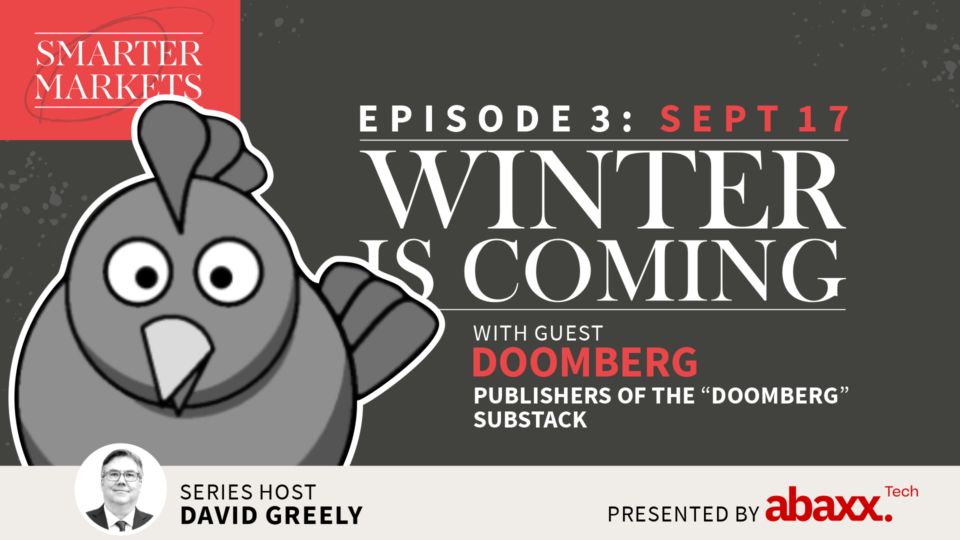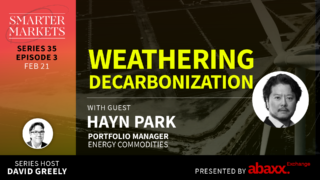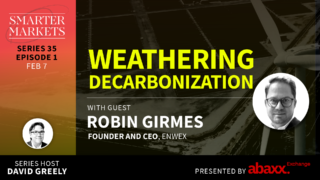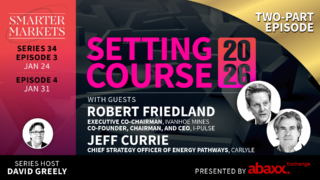In this episode, host David Greely welcomes energy and #fintwit icon, Doomberg, for an in-depth discussion on the European energy crisis covering the team’s take on the winter ahead in Europe and policy’s role in the path forward.
Hosted By
Episode Q&A
The following Q&A is created using slightly edited excerpts from the episode transcript, optimized for readability. Download full transcript.
Doomberg: As you’ve mentioned, yes, we are anonymous. I’m the head writer for a small team that runs the Doomberg Substack. In our real lives, we are consultants, and former industry executives in the commodity sector. I am a scientist by training and spent a couple of decades leading worldwide teams of researchers working on tough problems in the energy sector. My editor-in-chief, for example, has a very strong finance background, so we were consultants and doing quite well together as a team. After leaving the industry, we have probably 50 years of industry experience combined on the team, and then COVID hit and put a big dent into our business. We lost something like 80% of our business virtually overnight, and you have to decide what you’re going to do.
Doomberg: We got a fantastic piece of advice from a famous hedge fund manager who suggested that we should look into helping people who create content and sell it on Wall Street. Look into helping such people run their businesses better. He recognized our understanding of the finance world from the industry perspective and our abilities as business leaders and strategists, and we embarked upon that journey. And it was a fantastic 12 to 18 months after we decided to open up that vertical in our consulting business, and it was much more fun than our prior work, which had focused on C-suites and family office types, and we had a lot of success. One of our best clients suggested that we just start our own. His advice was you will follow all of your advice, unlike me, and build something from scratch.
Doomberg: I’ll lend you a hand, and it was the beginning of truly the work of our lives. It’s been an unbelievable 18 months, and we’ve grown the brand. We’ve improved the product and made it our full-time job. We’ve put our consulting business on hold. We’ve kept only our favorite clients. We’re turning away business, and doing Doomberg for a living, so why stay anonymous? I could tell you why we started anonymously. Building a brand behind a person from scratch is difficult if you have no social media presence. And one of our rules in marketing is that you can’t be remembered if you don’t stand out, and we sort of designed the green chicken one day. We were playing around with names. We did some preliminary AB testing. It scored amazingly well, and we just went with it.
Doomberg: Now, why stay anonymous? We have observed that when popular Twitter accounts or big anonymous social media accounts reveal themselves, sort of the error is let out of the balloon; the mystique, the intrigue is gone. So Doomberg has grown so big and so fast that we just can’t have a reveal ourselves. It’s not some big secret. There are lots of people on the street who know who we are. Substack knows who we are; Stripe knows who we are. Our painters know who we are and that we’re doing Doomberg ice. It’s just part of the brand now, and the last part I would make is that I’m the head writer and the person who appears on podcasts, but we truly are a very tight-knit team. And it wouldn’t make sense to rebrand around a person at this point. So we’re just going to stay as the green chicken. It’s a fun character, and that’s the background.
Doomberg: I would say the way we analyze the world is we begin with a very basic but critically important question, is the world currently experiencing an abundance of primary energy or a shortage of it? Unless you make an intelligent assessment of the answer to that question, it’s very difficult to analyze the markets for the past two decades. The Western world and the group of leaders within it have been bathing in excess of primary energy driven predominantly by the boom in shale oil and gas production in the US. When you are swimming in excess of primary energy, it is easy to think that the energy commodities are yesterday’s industries that can be considered and treated like any other fungible commodity, and don’t matter all that much.
Doomberg: It’s only when you enter into an unexpected period of a primary energy shortage the laws of physics take over and dictate the policy choices for our leaders, and a confluence of many events occurred in the past couple of years that pivoted the world from an era of excess to an era of chronic shortage. The three main ones are the ESG movement and the desire to defund fossil fuels when we do not have bridging technologies other than nuclear, which environmentalists also oppose. We do not have bridging technologies to get us from where we were to where we want to be with regard to carbon emissions. Yet, we still sort of saw it away at the legs of our stool by chopping away at the acceptability of funding fossil fuel development projects, that’s one. But to be fair to the environmentalists, it’s also true that the shale booming incinerated a lot of investor capital, which was all driven by access to cheap debt and abundant money.
Doomberg: And that investor capital was burned, and then the precipitating event of the shutdown of the economy in response to the pandemic was the catalyst that marked the pivot point from the era of abundance to the era of shortage. So when those three things converged in March of 2020, you saw a wave of bankruptcies, particularly in the shell patch and the companies that emerged from
court-supervised reorganizations have a cash-oriented mindset. They aren’t investing, and now we have what we have, which is chronic shortages of primary energy. And one of the themes that we’ve been pushing in a phrase we’ve become known for is energy is life, and energy commodities in times of shortages are extraordinarily elastic. What is the price elasticity of demand for life, and who can pay it? The clearing price for life is far above what most people can afford. And that’s what we’re experiencing right now. The genesis of the crisis was born in Europe. It has spread globally. The economy cannot survive in a way that we’re accustomed to if Europe collapses. We believe we are at a significant turning point and a historical one that is unfolding in real-time before us.
Doomberg: Well, that’s by choice too, though, in some ways, right? It doesn’t need to be this way, which is why we’ve been so critical.
Doomberg: So Putin certainly has the leverage for the economic part of this hybrid war. We believe and have written, and we’re writing as far back as a year ago, that by handing our energy cards to Putin, we should not be surprised when he decides to play them. We just put out a piece about it. And we had a fake quote that we put in. We usually open our pieces with a good quote, and this piece is called – Europe on tilt. The fake quote we used was in times of war, hand all the leverage to your enemy, then complain loudly when they use it. We handed Putin the keys to Europe’s energy future. We believe that he understood the leverage that he had and is now using against Europe. When Putin decided, which I think was incorrect, to cross the border into Ukraine and initiate a kinetic war in the heart of Eastern Europe.
Doomberg: I think that was a total blunder, to be very clear. Some have accused us on Twitter of being sort of relatively pro-Putin in our analysis. We don’t think it is unpatriotic to point out the reality on the playing field and to suggest alternatives that we believe would help achieve our geopolitical objectives. That’s what we’ve always tried to do. The cards that Putin has – were given to him by the west. He’s playing them now, and some would say, and I would concur, that completely shutting off the gas from Nordstream one is potentially a sign of weakness and desperation on his part, but it will certainly hurt Europe in the near future term. What it does for Putin in the mid to long term is a different question whatsoever. But I do believe he has the leverage. He is using it, and we’re on the cusp of a dire situation in Europe. We’re in the middle of one, given the headlines of the past week, which have been unbelievable.
Doomberg: Drawing on our direct and real-world experience in commodities, it differentiates our analysis on the support and topic we believe. Anybody who has ever operated ran a business in the commodity sector. I don’t mean as they worked at a think tank and study charts or taught at a university and read theory, but you’ve run a business with a P&L. You understand something very quickly; the first thing is you make all your money in very short periods of time. And discount cash flow models make, they’re almost meaningless for large commodity investments because you make all your money in very narrow windows, and then you do your best to tread water in between. And why is that? You make all your money when there’s a shortage.
Doomberg: The analogy we’ve used was predictable. We wrote a piece on June 1 called “Crazy Bills,” where we outlined what was wrong with the sanctions and what should be done to correct them, and here’s all you need to know. Putin exports 10 million barrels of oil a day. If we successfully shut in 5 million of those barrels and cut it in half, the price of oil would be way more than double, and Putin would make more revenue on the 5 million barrels still finding their way to the market. As perverse as it sounds, we should be encouraging Putin to flood the market, and we should be flooding the market because you cannot win a commodity war by trying to stop somebody else’s volume from reaching the market. When your objective is to reduce the value of your opponent’s commodity, you can only win a commodity war by flooding the market with the commodity. Oil went to minus $37 a barrel on relatively minor excess and a lack of storage at the peak of the COVID crisis. It swung violently to $125 a barrel on shortages, as small as half a million barrels a day.
Doomberg: If we were smart about this and we had people in government who took the time to get some experience in the industry preferably, but at a minimum, treat them as your allies and get them in into a room and have an open and honest discussion about what should be happening. We would’ve understood this; the sanctions have hurt the west way more than they’ve hurt Russia, and the pain is still to come. This is knowable, utterly well known. There are very few people with deep industry experience who have the freedom to write a blog like Doomberg. We have no overlords. We can write what we want to write. Our subscribers pay our bills. We have no ads and take no sponsorships so that we can have a hundred percent editorial freedom. This is so widely known in the industry that it is remarkable that this was the policy choice that we have made.
Doomberg: Now, having made that mistake, how do you correct it? Step A, you decide tomorrow to admit this was a mistake. Step B, hold a press conference surrounded by industry executives from the oil and gas. And say we were wrong, we’re going to do everything in our power to pump as much energy into the market to pivot the world back to the point of energy surplus, which will crush prices and defund Russia’s military expenditures. This is the only path forward. All other paths chosen right now do nothing but increase the price of primary energy, which feeds Putin’s greedy war machine.
Doomberg: It’s one thing to sanction, a small country that produces 200,000 barrels of oil per day for export that’s doable, but we’re talking about literally the largest exporter of energy in the world. As we said in the piece, I believe it wasn’t crazy pills. We don’t want to take Russia’s. We shouldn’t want to take Russia’s energy off the global market because it would collapse the entire modern economy,
including ours. There would be riots. There would be social unrest. There would be revolutions. The world cannot live without Putin’s energy at full stop. Axiom number one, in the analysis, if your objective is to minimize Putin’s revenue, the only handle you have is production volume, your production volume, and beg and pray that he doesn’t unilaterally cut the world off of his energy, just to make a point, which is what he is doing to Western Europe today.
Doomberg: We had no cards, and we’re still acting as though we have all the leverage; this is utterly crazy, G7 proposal on capping the price of Russian oil has to be the most insane thing we’ve ever seen – the hubris in their delusion. The G7 leaders think they can dictate to 4 billion people what they will pay for property that does not belong to the G7. It’s quite absurd, pushed forward by Janet Yellen, who is a product of cushy jobs at universities and a small stint at a think tank, but who has only otherwise lived in the halls of the federal reserve, it’s literal insanity, and it baffles the mind. This morning we have the president of the European Union out saying that in two weeks, to flatten the curve, we are going to do mandatory cutbacks of energy to flatten the curve because we just want to shave off the peaks. She has no idea what she’s talking about, and it’s okay to point out that the emperor has no clothes because that train will hit us either way. You may at least try to point out the flaws and the fallacies of the pronunciations of our political leaders. I mean, it’s crazy, but it is what it is. You know, it’s the world we find ourselves in.
Doomberg: Energy. In contrast, the ultimate currency, and the currencies we’re familiar with, the Euro, the Dollar, and the Yen; they are just sort of overlaying our energy transactions in the hopes of making them more efficient. That’s the way you need to think about the world. And this is especially true during a time of energy shortage. Everyone is saying the dollar is getting stronger against certain currencies. What are those currencies, so the way we measure the dollar strength today is through this index called the DXY, but if you look at the DXY, 83% of that index is composed of the Euro, the Yen, and the British Pound, all three of those regions are chronically short energy today.
Doomberg: And that’s why their currencies are de-basing for the exact front running of the phenomenon that we know government leaders will do, which is to try to print Fiat in a desperate effort to secure molecules, but of course, you can’t print molecules, and so the Russian Ruble, of course, has strengthened quite radically because Putin has all the cards. Now, the US dollar is doing quite fine against these currencies because the US is a net energy exporter. And so while energy and your position as an importer or an exporter, don’t explain all of the variances of your currency movement. It certainly explains a fair bit of it, and in times of chronic shortages, I would bet that your energy position might explain 80% of the variance of your currency movements, which is what we’re seeing today.
Doomberg: The Yen is collapsing as we speak, which is a sort of another bomb waiting to go off in Asia. So yes, you cannot print molecules! When you’re at a period of shortage and gone far enough into the season and plus Putin’s recent decision on Nordstream 1, it basically assures that Europe is entering the winter with insufficient molecules. So now the only question becomes what is the most economically efficient/socially acceptable way to ration the insufficient remaining molecules that they have. In our piece on Europe that we called the dead of winter, we rolled Doomberg’s law of antilogic, and in that law, we assume that the current slit of Western leaders will make the very worst possible decision at every opportunity. We advise our clients to assume as much in their modeling.
Doomberg: We have predicted price caps. We predicted stimulus, and we predicted protectionism. Still, a week later, as though things are accelerating at such a pace, not just price caps internally. Still, we had the president of the European Union today saying that she’s considering putting a price cap on global LNG as though she has some magic wand to dictate to the world the price of something everyone knows she desperately needs. It’s like Rome has fallen and the Roman Senate still thinks it’s a global superpower. It’s high time for Europe to get very serious about the important business of rationing in a way that minimizes damage to the most vulnerable in their society. So, for example, take Germany, they’ve rolled out a €65 billion stimulus to be paid for by windfall profits taxes on the very energy producers that they’re reliant upon in order to get the incremental volumes, to get them through the winter.
Doomberg: This will simultaneously increase the price, decrease supply, and backfire in the most spectacular way possible, thereby proving our theory of antilogic. We’re seeing the same thing in the UK. Look, this is not easy, and we take no pleasure in being right. We would much prefer to be on this podcast today, apologizing for being alarmist, but it’s just I don’t see a path out. It’s going to be amazing to watch this play out in the next few weeks and months.
Doomberg: In our writing, we have been especially critical of Justin Trudeau, who we think is perhaps the most dangerous and simultaneously least capable leader on offer in the Western world today. Canada could be an energy superpower right now, and Justin is just another example of somebody who was born on third base and thought he hit a triple and the son of a former prime minister who was sort of ascended to the throne, a charismatic guy, handsome man but intellectually incapable of leading his way out of a paper bag and so Canadian energy is trapped, Alberta’s Oil is finding its way to the US market. But the Keystone pipeline was canceled on the US side by Biden shares as much blame for that as anybody, but Putin’s nonsense about exporting hydrogen to Germany instead of just building the required liquefied natural gas export terminals. Natural gas in Western Canada is probably half the price of what natural gas is in the US, which is 1/10 the of the price that it was in Europe last week, to bank on Justin Trudeau’s regime to make an intelligent decision in the energy sector.
Doomberg: I put it this way. If you ask me to select who to be led by the current slate of European leaders or just Trudeau, I would reluctantly choose Europe. So I think we could just take Canada off the board until we see a regime change in Canada, which doesn’t seem to be on offer anytime soon.
Doomberg: So the best case is, in the next few weeks, the Western world plugs its nose and cuts the best deal it can get for peace with Putin. I know that’s probably a controversial thing to say, but as it pertains to resolving the energy crisis, that is the best case. That piece suddenly breaks out, or maybe Putin gets overthrown or pick your favorite path function, but hostilities end and taps open and molecules flow, and the world narrowly averts, what could have been a generational crisis. We hope for that outcome to be very clear, nothing would please us more than this crisis, passing with minimal hardship, born by those who can least afford to bear it. That’s the best case. The worst case is a rapid and hyperinflationary dissolution of Europe. There are scenarios where the pinball machine goes full tilt, which is why we wrote the last piece, Europe on tilt.
Doomberg: The worst-case scenario is that Putin follows through and keeps Northstream 1 down, but he has another valve he can turn: the pipeline through Ukraine if he completely cuts off Europe. And in fact one of Putin’s spokespeople said that any country proposing a price cap on Russian oil would get no gas, no oil, no finished products, no fertilizer, nothing. And if he follows through on that threat, at a time of maximum weakness for Europe, it could be a catastrophe. We see nothing in the current responses emanating out of European capitals that gives us hope that sensible policies will be chosen and one of the things we have predicted. And we fear a tilt of European politics already in Italy. You’re seeing the leading far-right candidate saying that we’re on our knees and we need to sue for peace.
Doomberg: We’re seeing demonstrations in the Czech Republic, Germany. There is a major risk to the ruling elite in Europe that if they continue to get this as wrong as they have, they will lose the authority to lead. We don’t think they will go down without a fight. There’s lots of scenarios you’re which is incredibly difficult to model. Still, if they enter the winter with us, there is a chronic shortage of molecules, as we anticipate they might. In their efforts to rationalize those molecules efficiently, they bundle it and make things worse, which all evidence would indicate they will. There are scenarios in play that get very ugly, very quickly.
Doomberg: It’s a great question. So I guess the best way to answer it is to tell you what our Bloomberg terminal launch pad fires up with every morning when we make it to the office. We look at the price of natural gas in the US, Europe, and Asia; often unspoken about in this crisis is the impact that elevated natural gas prices in Europe is having on Asia. The LNG contract price, JKM is $55 per million BTU today compared to $60 in Europe. So is Europe still paying more for the incremental carrier of LNG? We look at the coal price. So one of the charts that we make that we’ve not published yet, but we’re going to share it with our pro tier subscribers in a presentation later this month; we have developed a way to correct for the units of trade of all of these different energies/commodities so that you can just read across in a very simple way to see on a sort of dollar per million BTU basis, which helps you understand whether oil more expensive than coal, or is coal more expensive than natural gas.
Doomberg: One of the interesting phenomena that we see right now in the chart is the price of coal which is higher than the price of oil, which is interesting because, in theory, oil has far more utility. You can do many things with a barrel of oil. With coal, you can just burn it to make steam, to make electricity. And now that we see that coal is more expensive than oil is a fascinating little nugget of insight into the global economy. We look at the major currencies the Japanese Yen, the Euro, the Canadian Dollar, the Australian Dollar, and then obviously electricity prices in Europe as well, year forward prices. We look at the shape of curves; for example, the natural gas curve or Dutch TTF is pricing extraordinarily elevated prices out till 2024 that just a year ago would’ve been unthinkable. We are now priced into the curve out two years, $40, $50 per million BTU, natural gas, no economy can survive that.
Doomberg: We would look for increased flows. You can track the flows through Nordstream. We look at the molecules, the price of molecules, the currencies, and of course, you always keep an eye on gold and Bitcoin, sort of as reads for market mania or lack of it.
Doomberg: So there are a lot of thumbs on the scale right now, and a lot of it is sort of whispered about, and you don’t want to sound too conspiratorial because, okay, what other prices on your Bloomberg don’t you believe. We, of course, were accused of putting too much emphasis on the relative strength of the Russian Ruble because the constant refrain on Twitter was what can you do with a Ruble? It’s only because he has capital controls in place, and our counter to that there are 4 billion people still transacting with Russia and the number you see on the screen is real. We just take the mortgage back securities market, of course, the fed interfered in that market, but it doesn’t mean that when I went to the bank and got a mortgage, that I got a different price, because, well, this’s just correct for what the fed is doing. Prices is just a price, the numbers on the screen are real.
Doomberg: If the governments can intervene in the natural gas or oil markets and bring the price down, more power to them. And, of course, this is what OPEC is designed to do in the other way like OPEC exists to manipulate the price of oil. Prices are manipulated, and governments interfere, but the price on the screen is the price somebody’s paying, and it’s a clearing price somewhere. We just tend to believe it’s to give into the temptation of only believing the prices that fit with your narrative means you won’t capture the narrative shifts when they happen.
Doomberg: We have characterized the winter of 2022/23 as the greatest geopolitical event to resolve in the next few months. I would confess that we are surprised by the speed at which resolution is being imposed by the markets here; markets, of course, are forward indicating, so we shouldn’t have been so surprised. We view the resolution of this event in the same way that a physicist might view a singularity. In a singularity, the laws of physics breakdown, which means it is fruitless to try to predict what happens on the other side of that singularity because it’s unknowable. The big bang theory is predicated on such a singularity, and famous physicists like to say it doesn’t matter what happened before the big bang because it was a singularity, and we think there’s an economic singularity on the horizon.
Doomberg: The range of potential outcomes is so chaotic that it is fruitless to try to model it. We spend most of our time reading real-time data to see where things are going in the near term because, like the weather, you can predict 3, 4, or 5 days ahead; a week ahead is a bit sketchy. And after two weeks, just forget about it. We think we’re in the same type of scenario right now with Europe; you could imagine things like an overthrow of the German government, as crazy as that might sound. You could imagine things as crazy as mass starvation in Western countries because of a cold snap, like pray for a warm winter. And if your strategy is to pray, you’ve lost, no offense to the religious amongst your listeners, but it’s truly a singularity.
Doomberg: I don’t know that you can look past this December and speak with any kind of authority about what’s going to happen? What will things look like in the spring or winter or two years after that? Other than to say, perhaps, we will learn our lesson and reacquaint ourselves with physics over platitudes, but it’s not clear to me that whoever replaces this crop of leaders would be any better. I don’t think you could see through a singularity with any intelligence. And so it’s best just to admit that you can’t and observe the short term with keen interest.







